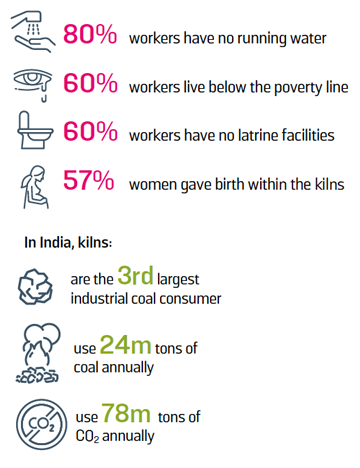One Health at Brooke case study - our work in brick kilns
This case study illustrates how Brooke is applying One Health approaches to tackle challenges to human, animal and environmental health in brick kilns.
Brick kilns – a threat to humans, animals and the environment

In South Asia building material for the growing megacities is produced in around 152,700 active brick kilns. These kilns employ over 16 million people and 500,000 animals, mainly horses, donkeys and mules, and produce 86% of the world’s bricks.
Working conditions in the kilns are harsh. Workers have to endure extreme heat, dusty and polluted air, tough terrains, long hours and hard physical labour. Many of them are women and children. In the brick kilns we have surveyed, 60% of workers lived below the poverty line, 80% had no running water and 60% had no latrine facilities. Restricted access to healthcare results in high rates of self-medication or use of unqualified doctors. Mental health is affected with 80% workers in one kiln reporting lack of pride in their work and 60% feeling no control over their lives.
Animals carry heavy loads in extreme heat, with limited access to water, food, shade and rest. Common health issues in animals working in the kilns are: hoof problems (50%), wounds (30%), abnormal gait (52%) and fear of human interaction (30%).
Brick kilns are a huge contributor to pollution across the continent. According to the World Bank, the brickmaking sector is responsible for up to 91% of total particulate matter emissions (solid airborne particles) in some South Asian cities.
The challenges in brick kilns cuts across human and animal health, as well as the environment, and the solutions need to be equally cross-sectoral – in short, One Health.
Tackling brick kiln challenges through a One Health partnership
It was with this in mind that Brooke has formed a coalition of organisations dedicated to improving labour conditions, animal health and welfare, child labour, and quality of the natural environment in brick kilns across South Asia: the International Labour Organisation (ILO), the South Asia Initiative to End Violence Against Children (SAIEVAC), the Donkey Sanctuary, the International Centre for Integrated Mountain Development (ICIMOD), World Wildlife Fund (WWF), ActionAid Nepal, International Union For Conservation of Nature (IUCN) and Global Fairness Initiative.
Impact to-date
One of the interventions led by a coalition partner is the ‘Green Bricks’ initiative, which is tackling harmful kiln emissions through the implementation of new ‘clean air’ technology. ICIMOD is working with the Climate and Clean Air Coalition (CCAC) in South Asia to train brick entrepreneurs and raise awareness of new, increasingly cost effective and scalable, kiln technologies and improvements in the brick production process. One of these technologies, called zigzag, reduces coal consumption by 20% and produces up to 70% lower levels of pollution than the existing technology.
Other interventions have included the introduction of human and animal first aid kits into kilns, health and safety training, linking workers to social care and health care schemes.
Significance for One Health
“Brooke’s contribution is one part of a much bigger picture. Only by embracing a One Health approach to our work in brick kilns are we truly able to enact lasting change for working animals, the people who rely on them and the environments they work in— which in turn reaps health benefits for a much larger population.”
Naeem Abbas, Brooke Pakistan Advocacy Manager.
Brooke's work in brick kilns
Read more about our support for brick kiln workers and their animals.
